COSEE-Ocean Learning Communities (COSEE-OLC) is focused on bringing cutting-edge research about the ocean out of the laboratory and into learning communities. These communities then put that knowledge to work, so that citizens become better stewards of our marine and aquatic environment. The COSEE-OLC effort is organized around four intersecting initiatives:
- Cultivate and Study a Marine Naturalist Volunteer Community
- Engage Citizens and Students in Contemporary Ocean Science Research
- Conduct and Communicate Research on Learning Science in Diverse Communities
- Conduct Inreach to Researchers, Outreach to Citizens
Among the accomplishments in our sixth year, several stand out:
- Connecting Scientists, Educators and Citizens to Address Environmental Challenges event
- Improving Your Broader Impacts Workshop
- Boat-Based Education Workshop
- Second year of the SoundCitizen Science Apprenticeship Program.
- Expansion of the My Place in Puget Sound curriculum for high school students.
- Programs and events throughout 2010/11 for Marine Naturalist Volunteers, Scientists (ocean, marine and learning) Educators and the public to come together to learn about current research
- Ocean Inquiry Project research cruises throughout 2010/11
- Conducting and publishing research on how people learn about the ocean and the environment, and communicating learning-science research to oceanographers and marine volunteers
Connecting Scientists, Educators and Citizens to Address Environmental Challenges
In February we collaborated with Washington Sea Grant to host an evening program held at the Seattle Aquarium that gathered over 150 scientists, graduate students and marine-based organization staff and volunteers. The event opened with a broader impacts opportunity for scientists and graduate students to meet with several marine-based organizations interested in involving current science and research in their programming. This was followed by a keynote talk, Celebrating Oceans and Outreach, by Dr. Lisa Graumlich, Dean of University of Washington (UW) College of the Environment (which the School of Oceanography is a part of). The theme of Dr. Graumlich’s talk was the importance of scientist engagement in outreach and highlighted examples of UW scientists and graduate students. Her talk concluded with an announcement that the College will start giving annual honorary awards to faculty, staff and students involved in education and outreach.
| | 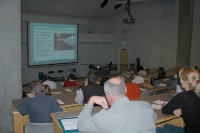 |
| Workshop participants attending the session Using Social Media Tools, presented virtually by Janice McDonnell from COSEE NOW and moderated by Tansy Clay from COSEE-OLC |
Improving Your Broader Impacts Workshop
We again collaborated with Washington Sea Grant in June to host an all-day workshop at UW. The workshop is an expansion of the program our Center presented in 2010, and provided a greater number of sessions related to broader impacts. We were excited to have other COSEE Centers join us as presenters at the workshop, including COSEE NOW presenting virtually on Using Social Media Tools; COSEE-Pacific Partnerships presenting sessions on Using Visual Data From Research and Concept Mapping; and COSEE Alaska, COSEE-Pacific Partnerships, COSEE-OLC, OR Sea Grant and WA Sea Grant presenting together on How Northwest COSEEs and Sea Grants Can Assist with Broader Impacts. The 150-plus workshop attendees included scientists, faculty, post docs, staff, graduate students and members of outreach organizations from Western Washington and Oregon. Other session topics included: communicating to the media, decision makers, K-12 students and lay audiences; using what you and your lab already do; existing opportunities, resources and support; using citizen science; program evaluation; and fellowship opportunities for graduate students engaged in education, outreach and post-doctoral teaching. The workshop concluded with a networking opportunity for participants to meet with local and regional outreach organizations who had displays and information on the ways that scientists can engage as part of their broader impacts.
Boat-Based Education Workshop
New this year, in February COSEE-OLC partnered with Washington Sea Grant and SoundCitizen to a host an all-day workshop at UW for organizers and science staff from boat-based education and outreach programs around Puget Sound. The goal of the workshop was to begin a dialog about enhancing participation of these (mostly informal) education programs in ocean research. Discussions were intentionally structured to fit within a public participatory framework so that organizations could think of themselves as long-term design partners for developing research projects. Participants left the workshop with excitement and enthusiasm for engaging in authentic science with SoundCitizen. Plans are currently under development for future work that will expand partnerships with these groups to other ocean scientists.
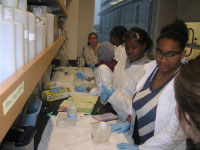 | |
Project COOL middle school girls process water samples in Rick Keil's lab, as part of their year-long program | |
Sound Citizen Science Apprenticeship Program (SCSA)
Funded through NSF’s Opportunities for Enhancing Diversity in the Geosciences the apprenticeship program is a two-year pilot program and represents a direct leveraging of COSEE-OLC activities to broader audiences. It also directly links COSEE’s missions in education and in scientist engagement by steeping apprentice activities in cutting-edge geosciences research. Project COOL is a partnership between the UW School of Oceanography, the UW Institute for Science and Mathematics Education and a youth group in Seattle called Passages Northwest. The first year of the project (2009-2010) brought students ages 13-17 from urban areas around Seattle to the UW campus to take part in geosciences research and mentorship experiences. This year (2010-2011) capitalized on last year’s success to work with middle school girls from diverse backgrounds in an urban neighborhood in Seattle. We set out to create “science learning apprenticeships” where youth are mentored by UW scientists and university students and collaborate with project staff and scientists to identify researchable questions, collect and process samples, and interpret and report the results. Fifteen girls worked with COSEE-OLC co-PI Rick Keil's lab as part of the SoundCitizen Program and decided to examine the presence of endocrine disruptors in personal care products like shampoo and toothpaste, in natural and built sources of water.
| | 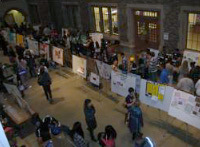 |
| Posters designed by high school students and presented at UW |
My Place in Puget Sound High School Curriculum
For the second year COSEE-OLC, in collaboration with SoundCitizen, the UW Institute for Science and Mathematics Education, and the UW Ocean and Coastal Interdisciplinary Sciences GK-12 program (OACIS GK-12), offered the high school level curricular materials, My Place in Puget Sound. The curriculum is a place-based inquiry science unit that addresses environmental issues with real and current data, is community relevant, and empowers students to act around environmental issues. The culminating event was a public poster session held in February at the UW campus. Over 160 high school students shared their projects with fellow students, scientists, graduate students, citizens and the university community. This project leveraged the strengths of all four contributing projects to create something that none of them could create alone.
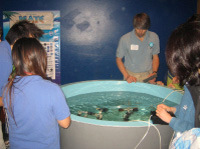 | |
Fritz Stahr, UW Oceanography scientist and COSEE-OLC PI, helping Seattle Aquarium guests demo ROVs | |
Engaging a Community of Marine Naturalist Volunteers, Scientists, Educators and Citizens
During Year Six we hosted, sponsored and supported events that provided opportunities for the general public to learn more about ocean science, both locally and nationally, as well as to expand our ocean learning community. In the fall of 2010 COSEE-OLC participated in the Seattle Aquarium’s Family Science Weekend and coordinated with scientists and students from the UW School of Oceanography to host four activity tables. UW Oceanography graduate and undergraduate students provided a table with a taste-test activity on salinity in Puget Sound; SoundCitizen scientists hosted a table on their water quality research using a watershed model and distributing water testing kits; scientists from Oceanography and the UW Applied Physics Lab provided opportunities to build and test out Remote Operated Vehicles (ROVs) in a tank; and members of COSEE-OLC’s marine volunteer community provided a Cartesian-diver and wave-in-a-bottle activities to help illustrate ocean principles. The weekend was a great success enjoyed by over 5000 Aquarium guests.
In the Spring COSEE-OLC participated in Washington’s Regional Ocean Science Competition, the Orca Bowl, held on the UW campus. It was an exciting day of competition involving 16 teams. The day concluded with an awards banquet held at the Seattle Aquarium.
And COSEE-OLC returned this year as one of the sponsors for the Seattle Aquarium’s 2011 Sound Conversations lecture series. The series is designed to engage and inform a general public audience about current ocean science related to the health of the world’s ocean and marine life. The series format is interactive and brings the audience into direct conversation with the speaker about their work, careers and interests. This year’s speakers included: Dr. Kristen Laidre, a UW scientist studying arctic marine mammals and climate change; Mark Schrader, captain and ocean explorer with the Around the Americas Project; and Daniel Beltra, a well-known photographer who presented on his experiences and photos of the Gulf of Mexico oil spill.
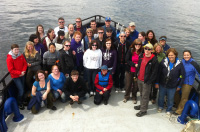 | |
OIP participants at the end of a
cruise in May 2011 | |
Ocean Inquiry Project Research Cruises
COSEE-OLC’s collaborating partner, Ocean Inquiry Project (OIP), continues to provide opportunities to integrate our communities through active field research on the water. OIP’s cruises foster an appreciation of ocean science, as well as Puget Sound, and increase awareness of our impact on the oceans for students and volunteers, ranging from fifth graders to retirees. Ocean Learning Community members who have participated in OIP cruises continue to highlight the successful nature of this environment for increasing respect and understanding between students, teachers, volunteers and researchers.
Learning Science and Environmental Education Research Update
COSEE-OLC, through the UW Institute for Science and Math Education, continues to conduct research on how people learn about the ocean and the environment, and communicates those findings to ocean scientists, other learning scientists, and teachers. In the past year, findings from this research have been presented at the annual meeting of Washington State’s Teacher Association (WSTA) and the annual meeting of the American Educational Research Association (AERA). A paper entitled “The role of borders in environmental education: Positioning, power, and the paradox of categories”, was accepted with revisions to the journal Ethnography and Education.
Visit COSEE-OLC!

